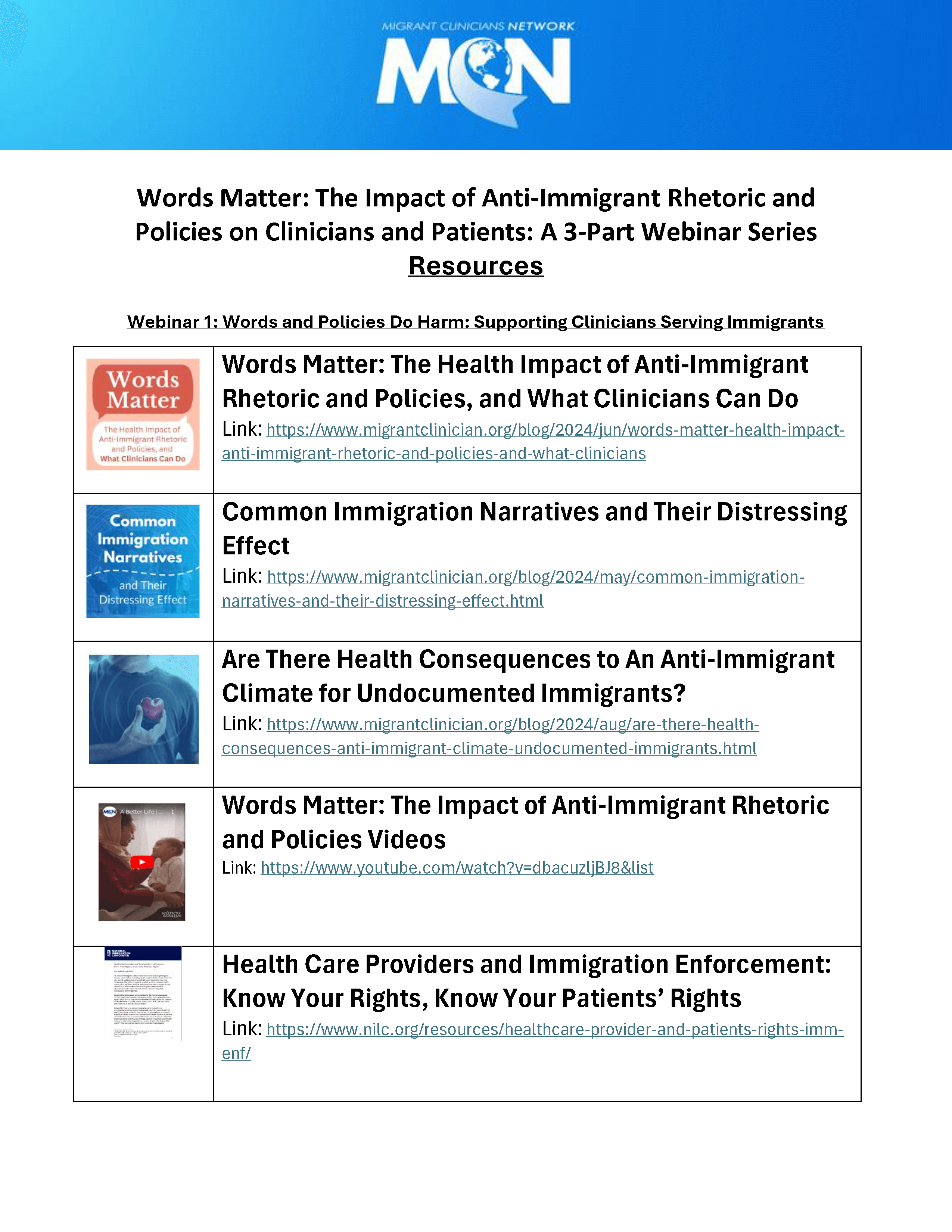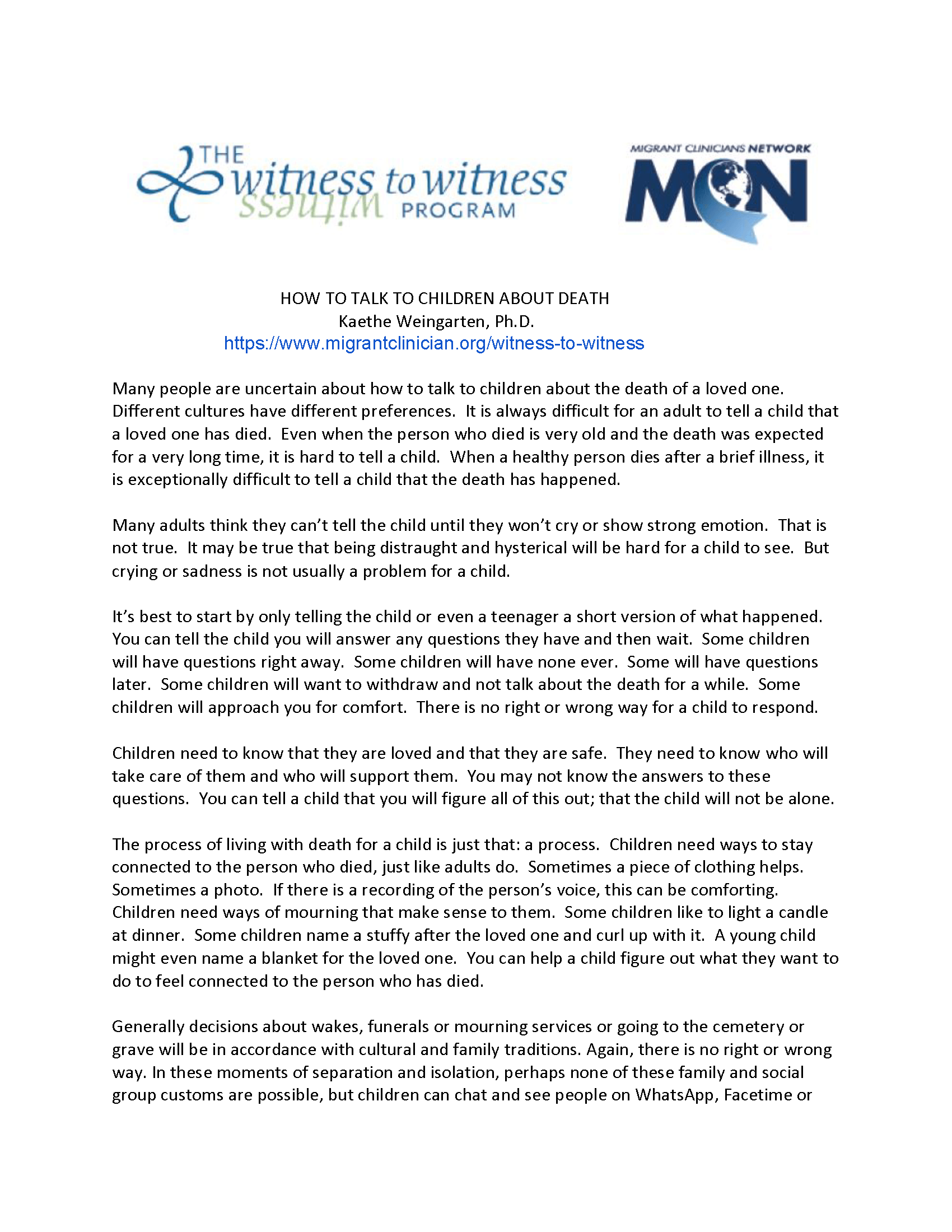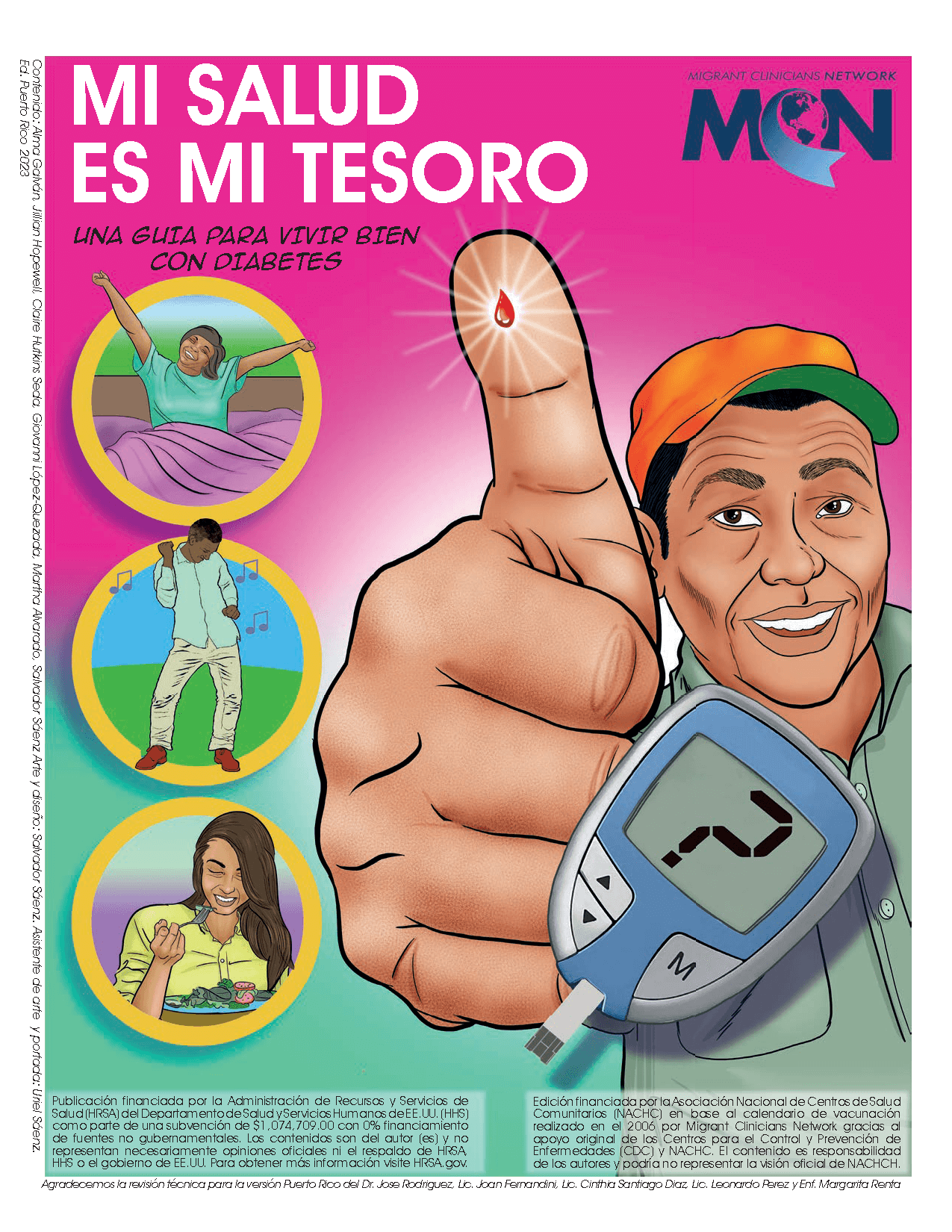- 2025_What is Self-Compassion.pdf (109 KB)
Wildfire smoke poses a significant health risk, particularly for vulnerable populations such as farmworkers, given the nature of their jobs and their extended exposure to outdoor environments. This guide provides clinicians and community health workers (CHWs) with an overview of the effects of exposure to wildfire smoke, the reasons why farmworkers are more vulnerable to wildfire smoke, specific considerations for farmworkers, and practical strategies for preventive measures.

Witness to Witness's campaign, "Words Matter: The Impact of Anti-Immigrant Rhetoric and Policies on Clinicians and Patients," included a three-part webinar series. This series offered numerous resources including information and data on the health consequences of anti-immigrant rhetoric; clinical implications of immigration-related Adverse Childhood Experiences (ACEs); and strategies to support immigrant mental health. This document brings together all the resources and recommended websites from the three-part series. In English.
National STD Curriculum from the University of Washington STD Prevention Training Center. Provides information on different STDs and STIs, which are available for Quick Reference. There is also the option to Self-Study, allowing the user to track progress and receive Continuing Education credit.
From the CDC Morbidity and Mortality Weekly Report, Vol. 70, No. 4, published July 23, 2021.
Summary: "These guidelines for the treatment of persons who have or are at risk for sexually transmitted infections (STIs) were updated by CDC after consultation with professionals knowledgeable in the field of STIs who met in Atlanta, Georgia, June 11–14, 2019. The information in this report updates the 2015 guidelines. These guidelines discuss 1) updated recommendations for treatment of Neisseria gonorrhoeae, Chlamydia trachomatis, and Trichomonas vaginalis; 2) addition of metronidazole to the recommended treatment regimen for pelvic inflammatory disease; 3) alternative treatment options for bacterial vaginosis; 4) management of Mycoplasma genitalium; 5) human papillomavirus vaccine recommendations and counseling messages; 6) expanded risk factors for syphilis testing among pregnant women; 7) one-time testing for hepatitis C infection; 8) evaluation of men who have sex with men after sexual assault; and 9) two-step testing for serologic diagnosis of genital herpes simplex virus. Physicians and other health care providers can use these guidelines to assist in prevention and treatment of STIs."
- STI-Guidelines-2021.pdf (4.24 MB)
CDC framework for assisting clinicians in discussing the sexual health issues of a patient in order to obtain a more complete picture of the patient's overall health. The guide covers the clinical environment, the Five "P"s, and other dialogue with the patient that may arise by the end of the session.
CDC Guidelines, for clinicians, on the use of doxy PEP for the prevention of bacterial STIs. Provides education on prescribing doxy PEP (such as who benefits and for which STIs, potential side effects, etc.), what is still being researched, and a list of additional resources.
Migrant Clinicians Network spoke with Jeff Bender, DVM, MS, DACVPM, about the highly pathogenic avian influenza (HPAI) in dairies and what clinicians need to know. View some of the key moments of that interview here:
|
|
- Avian-Flu-and-Your-Safety-Guidance-for-Dairy-Workers_2024-5-14.pdf (1.11 MB)
- La-gripe-aviar-y-tu-seguridad-Guia-para-trabajadores-de-lecherias_2024-5-14.pdf (1.11 MB)
- Avian-Flu-and-Your-Safety-Guidance-for-Dairy-Workers_2024-5-14.png (455.92 KB)
- La-gripe-aviar-y-tu-seguridad-Guia-para-trabajadores-de-lecherias_2024-5-14.png (456.92 KB)
This pilot project was a collaborative effort involving project partners Futures Without Violence, Alianza Nacional de Campesinas, Líderes Campesinas, RAND, and Migrant Clinicians Network and was made possible with the support of California's ACEs Aware initiative through the UCLA-UCSF ACEs Aware Family Resilience Network (UCAAN) pilot program.
Education, screening, and response with evidence-based interventions are critical to addressing ACEs. However, ACEs education and screening that are culturally aware are not currently reaching farmworker communities in California. NACES aimed to increase opportunities for farmworkers to inform health care screening and responses to ACEs, increase ACEs education in farmworker communities, build partnerships between community health centers and community-based organizations, and ultimately improve access to care.
The project was divided into two parts, a community-based component presented in this report and a clinical component that examines how the results and recommendations of this community-based portion changed health center outreach, education, and response to ACEs. The community-based component was divided into two phases. Phase 1 involved the evaluation of farmworker leader training and Phase 2, the evaluation of the peer-led farmworker training.
The evaluation team employed a participatory action research (PAR) approach, developing instruments, presenting, and validating results with the partners to ensure active participation and collective action from all project partners and the farmworker leaders themselves.


La diabetes es una condición de salud común pero complicada que enfrentan los trabajadores agrícolas. Para ayudarles a conocer sobre esta enfermedad, Migrant Clinicians Network se asoció con Salvador Sáenz (artista profesional y coloborador) para crear "Mi salud es mi tesoro: una guía para vivir bien con diabetes". Este libro cómico en español explora el tema a través de la historia de un trabajador agrícola, quien recientemente fue diagnosticado con diabetes.
COVID-19 and Our Community: Better Safe Than Sorry! is an educational material to support the work of community health workers on COVID-19 and its prevention. It is complemented by a guide with concrete suggestions on how to use the flipchart and links to resources for those who want to delve deeper into the subject and investigate if there are any changes in the information.
The flipchart includes basic concepts of COVID-19, prevention and vaccination in the form of clear and simple messages that are supported by culturally appropriate illustrations to facilitate the process of communicating and transmitting information to community members. You can download these resources for free in both English and Spanish.

- 2023-3-24_Opioids-patient-resource.pdf (1.76 MB)
- 2023-3-24_Opioides-recurso-paciente.pdf (1.76 MB)

- Juego Ready 2 Help Guia.pdf (5.76 MB)
- Juego Ready 2 Help.pdf (1.09 MB)
- Preparate con Pedro - comic.pdf (6.21 MB)
- 12 formas de prepararse.pdf (288.86 KB)
- Documente y asegure su propiedad.pdf (1.35 MB)
- Plan de comunicacion familiar ninos.pdf (1.56 MB)
- Plan de comunicacion familiar padres completo.pdf (966.72 KB)
- Plan de comunicacion familiar padres.pdf (265.43 KB)

- Contaminacion del agua-Info1-La vuelta al mundo_0.pdf (246.73 KB)
- Contaminacion del agua-Info2-Personalidad_0.pdf (148.16 KB)
- Contaminacion del agua-Info3-Leyes y costumbres_0.pdf (124.07 KB)
- Contaminacion del agua-Info4-En la practica_0.pdf (147.93 KB)
- Contaminacion del agua-Info5-Comic_0.pdf (248.47 KB)
- Contaminacion del agua-Lluvia de ideas_0.pdf (77.55 KB)
- Contaminacion del agua-Organizador grafico_0.pdf (79.69 KB)
- Contaminacion del agua-Quiz_0.pdf (128.38 KB)
- Contaminacion del agua-Vocabulario_0.pdf (75.77 KB)

Migrant Clinicians Network's white paper, “Failures of US Health Care System for Pregnant Asylum Seekers,” outlines how pregnant asylum seekers who have been released into the US to await their asylum hearing face extreme obstacles to secure prenatal care, despite their legal presence within the country.
Without prenatal care, infants will not have the benefit of early screening and treatment for potentially life-threatening diseases and screening for congenital abnormalities, while in utero. Additionally, pregnancies without prenatal care may result in excess utilization of emergency services which produces unforeseen strain on the health care system.
Knowledge of prenatal care needs, cost, lack of insurance, transportation, refusal by health centers, and fear are delineated as key barriers for pregnant asylum seekers from accessing the care they need during their pregnancy.
Press contact: Claire Hutkins Seda, cseda@migrantclinician.org.
Among the many obligations health care providers have to their patients, their families and life in general, they forget to put themselves on the priority list. This comic book dedicated to health care providers reminds them how important it is to take care of themselves to meet the needs of their patients and families. It also offers simple self-care steps to improve overall wellness.


- 2022-9-6_Viruela-del-mono-Prevencion+Recomendaciones_imagen.png (193.95 KB)
- 2023-1-26_What-is-Mpox_Handout.pdf (1.26 MB)
- 2023-1-26_What-is-Mpox_Image.png (207.81 KB)
- 2023-1-26_Mpox-Prevention-and-Recommendations_Handout.pdf (1.11 MB)
- 2023-1-26_Mpox-Prevention-and-Recommendations_Image.png (194.02 KB)
- 2023-1-26_Que-es-Mpox.pdf (1.26 MB)
- 2023-1-26_Que-es-Mpox_Imagen.png (223.59 KB)
- 2023-1-26_Mpox-Prevencion-y-Recomendaciones.pdf (1.11 MB)
- 2023-1-26_Mpox-Prevencion-y-Recomendaciones_Imagen.png (197.04 KB)

- 2021-6-4_W2W-low-impact-disclosure.pdf (135.8 KB)
- 2022-6-13_Enfermedades-causadas-por-el-calor_Presentacion.pptx (19.18 MB)
- 2022-6-13_HeatStressSpanishFLIPCHART.pdf (7.81 MB)
- 2022-7-21_Heat-Stress-Facilitator-GuideSpanish.pdf (2.43 MB)
- 2022-6-13_Heat-related-illness_Presentation - English.pptx (21.41 MB)
- 2022-7-21_Heat-Stress-Facilitator-GuideEnglish.pdf (2.5 MB)
- 2024 Guia para entrenadores Calor extremo-trabajadores construccion (3).pdf (2.82 MB)
- 2024 PPT para facilitadores Calor extremo-trabajadores construccion (1).pdf (15.8 MB)

- ENG_Campaign_Email_Template-Initial_Email.docx (26.65 KB)
- SPA_Formato_Correo_Electrónico-Correo_Electronico_Inicial_07_23_2021_.docx (30.69 KB)
- SPA_Formato_de_Correo_Electrónico-Registro_de_Vacunas_Publicacion_en_Redes_Sociales_07_23_2021.docx (26.94 KB)
- ENG_Campaign_Email_Template-Vaccine_Sign-Up_Social_Media_Post_Sharing_With_Spanish_Post_Translations_07212021.docx (25.13 KB)
- ENG_Campaign_Email_Template-Vaccine_Sign-Up_Social_Media_Post_Sharing_With_Haitian_Creole_Post_Translations.docx (24.74 KB)
- ENG_Campaign_Email_Template-Community_Leader_Highlight_Social_Media_Post_Sharing.docx (23.86 KB)
- SPA_Formato_de_Correo_Electrónico-Lideres_del_la_Comunidada_Para_Destacar_y_Compartir.docx (26.52 KB)
- SPA_Formato_Correo_Electrónico-Videos_de_las_Redes_Sociales_07_23_2021.docx (23.79 KB)
- ENG_Campaign_Email Template-Social_Media_Videos_With_Spanish_Translations.docx (25.05 KB)
- ENG_Campaign_Email Template-Social_Media_Videos_With_Haitian_Creole_Translations.docx (25.74 KB)
- ENG_Campaign_Email_Template-Thank-You_Email.docx (21.83 KB)
- SPA_Formato_Correo_Electrónico-Correo_Electronico_De_Gracias.docx (23.38 KB)





